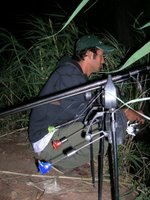Al St. Cyr has finally graduated. At first glance, it’s a stunning accomplishment. The 24-year-old, on-again, off-again student had – effortlessly – molded himself into that proto-Austin phenomenon: the slacker.
 Richard Linklater, who popularized the term in his 1990 film of the same name, has lamented in print that the term “slacker” (“one who shirks work or responsibility,” according to the American Heritage dictionary) is used in such a negative way.
Richard Linklater, who popularized the term in his 1990 film of the same name, has lamented in print that the term “slacker” (“one who shirks work or responsibility,” according to the American Heritage dictionary) is used in such a negative way.
“It’s a film of 100 people, and they don’t work, and they don’t do anything,” he told an Austin Chronicle interviewer in 2001. “And my whole point was: No, they do a lot. A lot of people in the film, they’ve all got their projects, they’ve all got their activities.”
Al’s project, his activity, is fishing. Carp fishing, to be specific.
“I was briefly a student, before fishing season started,” he says. Learning, he liked. It was the sitting in class while the fish might be biting that put a damper on things.
His family – happily at first, and less happily as time went on -- supported him. Maybe, in part, because they somehow thought he was still … well, in school or something.
His grandmother in particular, says girlfriend Sally Malone, was after him to graduate, get a job. One or the other. Both, if he could manage it.
Sally, who works a regular 40-hour week at a busy downtown law firm, says the quiet, lanky young man was up-front with her from the beginning.
“He told me: ‘I fish. You’re going to have to accept that,’” she says. “And it was okay, because he was just so sweet.”
She’s supportive, if not enthusiastic. Sometimes – especially in the early days -- Sally tagged along with her boyfriend.
“It’s nice, to sit by the lake and read and talk,” she says. “It’s a good way to get to know someone.”
On the night Al graduated – at the penultimate moment, in fact, as he stood on the cusp of his new life – he was on the phone with Sally. She had just left work and wanted to know if he needed anything.
“Yeah, bring me a monster taco and a Mountain Dew,” he remembers telling her.
A little while earlier – 15 minutes earlier, maybe – he’d been awakened by a couple of “bleeps.” That’s the sound the bite alarm on his fishing rod makes when the line moves.
It was the next-to-last day of a six-day carp fishing tournament on Lake Austin, and Al had moved his hundreds of pounds of gear 11 times. He was wiped-out. Crashing at midnight and getting up at 4 a.m. was really taking a toll.
Earlier in the week, a rumor had swept the contestants that Al was dead – drowned when his inflatable boat, loaded with about 200 pounds of bait, capsized in a thunderstorm.
Sally heard the rumor and called to verify: “Are you dead?” she asked.
“No, just stuck,” Al told her. Wind and water had conspired to trap him behind an island, hundreds of yards from shore. It would take about two hours for him to make it back to dry land.
Now, though, it’s the next-to-last day of the tournament. The alarm goes off. Al rises from his nap, reels into the fish and begins fighting it to shore. It’s a big fish. Maybe the record-breaker, the one worth a cool quarter million dollars. The one every angler in this American Carp Society event is hoping to catch.
Just under his rod tip, the fish wraps up a dead tree in the water. The line goes slack. Al’s phone rings. It’s Sally. He sets the rod down and places his fast food order.
After he hangs up, he pulls “for the break.”
“I was just trying to break the line,” he recalls. “Then, I felt it move a little bit and could tell the fish was still on there. I saw how big it really was and I went crazy. I started screaming and yelling. Believe it or not.”
The “believe it or not” isn’t rhetorical, not if you know Al. With his Prada shades and casual, slightly unkempt clothes, he possesses the effortless cool that teenage rebels aspire to. It’s not hard to picture him dong something with intense, even fierce, concentration. Like fishing. But it’s a stretch to imagine him jumping up and down in excitement about anything.
After the 43.125-pound common carp was weighed, released and duly certified as the new Texas state record, Al got a check. It was his first real payday in a long time, and it marked a turning point.
 The richest prize in catch-and-release carp fishing history – and however nascent the sport is in the U.S., Europeans have been carping for centuries – instantly made Al a professional.
The richest prize in catch-and-release carp fishing history – and however nascent the sport is in the U.S., Europeans have been carping for centuries – instantly made Al a professional.
He had graduated, finally, from the ranks of the many avid, if accomplished, amateurs to the rarified world of those who are paid to fish.
Has that changed his life?
“Not at all,” he says, after a thoughtful pause. “I guess I really was a slacker. Now I’m just a slightly wealthier slacker.”
A slacker some previously skeptical family members are now proud of, by all accounts. A slacker who says his hard-won windfall will just give him more freedom to do what he loves most.
“Carp fishing basically is my life,” Al says. “It consumes most of my thoughts.”
 Richard Linklater, who popularized the term in his 1990 film of the same name, has lamented in print that the term “slacker” (“one who shirks work or responsibility,” according to the American Heritage dictionary) is used in such a negative way.
Richard Linklater, who popularized the term in his 1990 film of the same name, has lamented in print that the term “slacker” (“one who shirks work or responsibility,” according to the American Heritage dictionary) is used in such a negative way.“It’s a film of 100 people, and they don’t work, and they don’t do anything,” he told an Austin Chronicle interviewer in 2001. “And my whole point was: No, they do a lot. A lot of people in the film, they’ve all got their projects, they’ve all got their activities.”
Al’s project, his activity, is fishing. Carp fishing, to be specific.
“I was briefly a student, before fishing season started,” he says. Learning, he liked. It was the sitting in class while the fish might be biting that put a damper on things.
His family – happily at first, and less happily as time went on -- supported him. Maybe, in part, because they somehow thought he was still … well, in school or something.
His grandmother in particular, says girlfriend Sally Malone, was after him to graduate, get a job. One or the other. Both, if he could manage it.
Sally, who works a regular 40-hour week at a busy downtown law firm, says the quiet, lanky young man was up-front with her from the beginning.

“He told me: ‘I fish. You’re going to have to accept that,’” she says. “And it was okay, because he was just so sweet.”
She’s supportive, if not enthusiastic. Sometimes – especially in the early days -- Sally tagged along with her boyfriend.
“It’s nice, to sit by the lake and read and talk,” she says. “It’s a good way to get to know someone.”
On the night Al graduated – at the penultimate moment, in fact, as he stood on the cusp of his new life – he was on the phone with Sally. She had just left work and wanted to know if he needed anything.
“Yeah, bring me a monster taco and a Mountain Dew,” he remembers telling her.
A little while earlier – 15 minutes earlier, maybe – he’d been awakened by a couple of “bleeps.” That’s the sound the bite alarm on his fishing rod makes when the line moves.
It was the next-to-last day of a six-day carp fishing tournament on Lake Austin, and Al had moved his hundreds of pounds of gear 11 times. He was wiped-out. Crashing at midnight and getting up at 4 a.m. was really taking a toll.
Earlier in the week, a rumor had swept the contestants that Al was dead – drowned when his inflatable boat, loaded with about 200 pounds of bait, capsized in a thunderstorm.
Sally heard the rumor and called to verify: “Are you dead?” she asked.
“No, just stuck,” Al told her. Wind and water had conspired to trap him behind an island, hundreds of yards from shore. It would take about two hours for him to make it back to dry land.
Now, though, it’s the next-to-last day of the tournament. The alarm goes off. Al rises from his nap, reels into the fish and begins fighting it to shore. It’s a big fish. Maybe the record-breaker, the one worth a cool quarter million dollars. The one every angler in this American Carp Society event is hoping to catch.
Just under his rod tip, the fish wraps up a dead tree in the water. The line goes slack. Al’s phone rings. It’s Sally. He sets the rod down and places his fast food order.
After he hangs up, he pulls “for the break.”
“I was just trying to break the line,” he recalls. “Then, I felt it move a little bit and could tell the fish was still on there. I saw how big it really was and I went crazy. I started screaming and yelling. Believe it or not.”
The “believe it or not” isn’t rhetorical, not if you know Al. With his Prada shades and casual, slightly unkempt clothes, he possesses the effortless cool that teenage rebels aspire to. It’s not hard to picture him dong something with intense, even fierce, concentration. Like fishing. But it’s a stretch to imagine him jumping up and down in excitement about anything.
After the 43.125-pound common carp was weighed, released and duly certified as the new Texas state record, Al got a check. It was his first real payday in a long time, and it marked a turning point.
 The richest prize in catch-and-release carp fishing history – and however nascent the sport is in the U.S., Europeans have been carping for centuries – instantly made Al a professional.
The richest prize in catch-and-release carp fishing history – and however nascent the sport is in the U.S., Europeans have been carping for centuries – instantly made Al a professional.He had graduated, finally, from the ranks of the many avid, if accomplished, amateurs to the rarified world of those who are paid to fish.
Has that changed his life?
“Not at all,” he says, after a thoughtful pause. “I guess I really was a slacker. Now I’m just a slightly wealthier slacker.”
A slacker some previously skeptical family members are now proud of, by all accounts. A slacker who says his hard-won windfall will just give him more freedom to do what he loves most.
“Carp fishing basically is my life,” Al says. “It consumes most of my thoughts.”

No comments:
Post a Comment